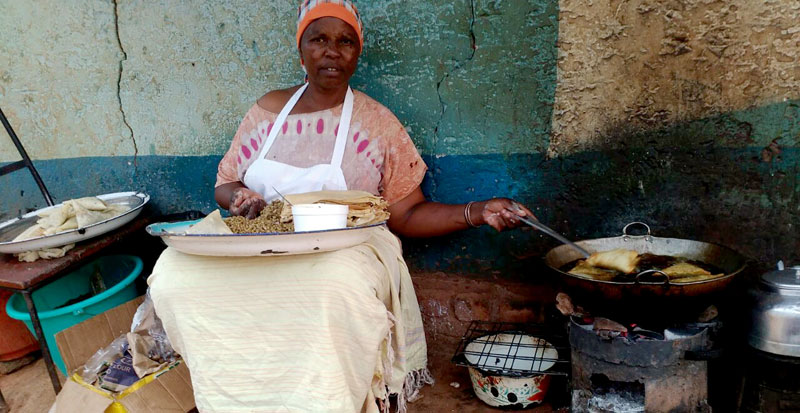It is 6.30pm East African Time. Sitting under the shade, in front of our little house along Mumias-Kakamega Road and looking skywards, I am unable to tell the difference between sunset and late afternoon. For the 10 years I have lived here, Mumias, in western Kenya, has been like that. Ours is one bright town!
Just across the road is the new matatu stage. It is only two weeks since construction began but from the look of things, it won’t take much longer to complete it. I can only imagine the result, good I guess!
Maybe I should go and have a cup of steamy spiced black tea from the famous ‘Mama Shamim’ just opposite Mumias Muslim Primary School, along Kakamega-Mumias Road, with a couple of my favorite tasty samosas.
As I am pondering over this idea a boy in tattered clothes approaches me. He is sniffing gum. He asks me for a ‘kobole,’ which is a five-shilling coin, to buy himself something to eat.
“If you only promise to buy something to eat that’s when I will give you the money,” I tell him, because I know he only wants to buy gum with the money. He promises and I give him the money.
As I stand up to go to Mama Shamim, I look across the road to see street vendors with their products going towards an approaching matatu. It is common practice here for sellers to run towards vehicles to try their luck at selling to the passengers.
Although Mumias is a small town, it has busy streets. As I gaze at the Crown bus that is filled with passengers going to Nairobi, a hawker stops me in the middle of my thoughts and says: “mali mali bei hasara nunua saa kwa bei poa buda,” imploring me to buy a watch at a good price. I just look at him and tell him “maybe next time.”
The town around me is a very wonderful place for one looking for a quieter city to live in. With shops and countable storied buildings, and only two big supermarkets, I would say I prefer it that way!
Reaching the junction and taking a turn to the left, I look at the shops that are lined along the road opposite Jamia Mosque and I reflect on how much the town has changed. In 2007, when Mwai Kibaki started his second term as President of Kenya, many of the shops were not yet established.
The place was a slum with shabby mabati [iron sheet] houses, poor sanitation, a high number of chokora (street children) and also young girls operating as sex workers. With the establishment of Mjini as a street, now we have modern houses and good roads.
From a distance I can see our evening tea place filled with people. I see myself there today evening taking my tea while listening to stories from my counterparts in tea!
Mumias, especially to nonresidents, is most known for producing high quality sugar sold within and outside Kenya. It is Kenya’s leading sugarcane and sugar producer. This town is home to Mumias Sugar Company which is the town’s chief employer and Kenya’s biggest sugar factory.
Evidence of sugar is all over the town and its environment. You see it on the big billboards. You see it on street light poles. One cannot be in town for more than five minutes without seeing a tractor full of sugarcane passing by on its way to the factory. But there is more to sugar than meets the eye. Mumias is also Western Kenya’s melting pot of culture and religion.
Records indicate that Mumias became an urban council in 1988 but historically, it is the capital of the Luhya Kingdom.
Mumias has a considerably large Muslim population and most of them subscribe to the Sunni sect. In this town, I have not seen and I don’t know of a single pork butchery.
Mumias is a nice place to live in. But when you think about the HIV/AIDS scourge ravaging the community, you can fear for the future.








